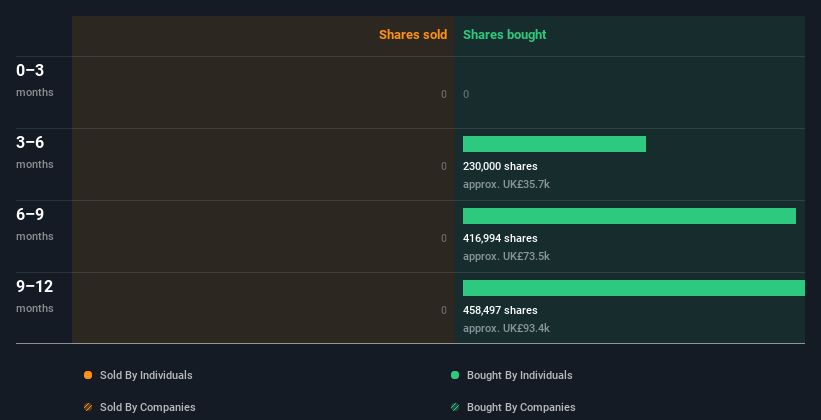This Insig AI Insider Increased Their Holding In The Last Year
Insiders were net buyers of Insig AI Plc's (LON:INSG ) stock during the past year. That is, insiders bought more stock than they sold.
While we would never suggest that investors should base their decisions solely on what the directors of a company have been doing, logic dictates you should pay some attention to whether insiders are buying or selling shares.
View our latest analysis for Insig AI
Insig AI Insider Transactions Over The Last Year
In the last twelve months, the biggest single purchase by an insider was when Executive Chairman Richard Bernstein bought UK£49k worth of shares at a price of UK£0.24 per share. So it's clear an insider wanted to buy, even at a higher price than the current share price (being UK£0.17). It's very possible they regret the purchase, but it's more likely they are bullish about the company. We always take careful note of the price insiders pay when purchasing shares. Generally speaking, it catches our eye when an insider has purchased shares at above current prices, as it suggests they believed the shares were worth buying, even at a higher price. Richard Bernstein was the only individual insider to buy during the last year.
Richard Bernstein bought a total of 1.11m shares over the year at an average price of UK£0.18. You can see a visual depiction of insider transactions (by companies and individuals) over the last 12 months, below. By clicking on the graph below, you can see the precise details of each insider transaction!
Insig AI is not the only stock that insiders are buying. For those who like to find winning investments this free list of growing companies with recent insider purchasing, could be just the ticket.
Insider Ownership
For a common shareholder, it is worth checking how many shares are held by company insiders. We usually like to see fairly high levels of insider ownership. Insig AI insiders own about UK£8.7m worth of shares (which is 47% of the company). This kind of significant ownership by insiders does generally increase the chance that the company is run in the interest of all shareholders.
So What Do The Insig AI Insider Transactions Indicate?
It doesn't really mean much that no insider has traded Insig AI shares in the last quarter. On a brighter note, the transactions over the last year are encouraging. It would be great to see more insider buying, but overall it seems like Insig AI insiders are reasonably well aligned (owning significant chunk of the company's shares) and optimistic for the future. While we like knowing what's going on with the insider's ownership and transactions, we make sure to also consider what risks are facing a stock before making any investment decision. At Simply Wall St, we've found that Insig AI has 5 warning signs (2 are concerning!) that deserve your attention before going any further with your analysis.
But note: Insig AI may not be the best stock to buy. So take a peek at this free list of interesting companies with high ROE and low debt.
For the purposes of this article, insiders are those individuals who report their transactions to the relevant regulatory body. We currently account for open market transactions and private dispositions of direct interests only, but not derivative transactions or indirect interests.
Have feedback on this article? Concerned about the content? Get in touch with us directly. Alternatively, email editorial-team (at) simplywallst.com.
This article by Simply Wall St is general in nature. We provide commentary based on historical data and analyst forecasts only using an unbiased methodology and our articles are not intended to be financial advice. It does not constitute a recommendation to buy or sell any stock, and does not take account of your objectives, or your financial situation. We aim to bring you long-term focused analysis driven by fundamental data. Note that our analysis may not factor in the latest price-sensitive company announcements or qualitative material. Simply Wall St has no position in any stocks mentioned.

 Yahoo Finance
Yahoo Finance 
